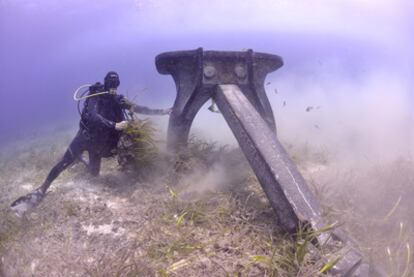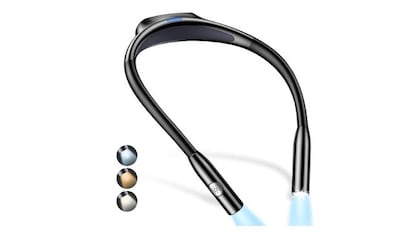Why one of the Med's greatest assets is threatened by yachts and speedboats
Huge swathes of invaluable Neptune Grass are being ripped out of the sea bed by anchors, but no one in the Balearics seems willing to take responsibility
One of the greatest natural treasures of the Mediterranean, its underwater fields of posidonia oceanica, a seagrass commonly known as Neptune Grass, are in serious danger of disappearing in just a few years. The lack of control over ships dropping anchor off the shores of the Balearic Islands is decimating large stretches of this aquatic plant, which is one of the key elements of the marine ecosystem, providing breeding areas and playing a vital role in converting CO2 into oxygen. It's also important in terms of tourism, given that its presence accounts for the crystal-clear waters that attract hundreds of thousands of tourists every year.
The skippers of the yachts are unaware that the area is home to one of the biggest and longest-living beings on the planet, while at the same time no one is taking responsibility to ensure that boats don't encroach on areas where weighing anchor is prohibited. It's a problem that affects the entire Balearic archipelago. But this year, it is on the island of Formentera where efforts have begun to combat the problem.
"Over the last few years the surface area of seagrass has probably been reduced by 30 or 40 percent in the strip of water that separates Punta Pedrera and S'Espalmador," explains the marine biologist Manu San Félix. "And in three or four more years it could end up totally destroyed."
At the end of July, the team of biologists and divers that San Félix heads up used satellites to study the movements of a large yacht that was anchored in the area. In 24 hours, its anchor destroyed close to 10,000 square meters of Neptune Grass, which is a size equivalent to a soccer pitch. San Félix stresses that it is not just large ships that are responsible for ravaging the sea bed.
"Even the smallest boats cause huge damage, because there are so many of them," he explains. Hundreds of anchors act like an army of underwater plows, ripping out the plant by its root.
The Formentera Neptune Grass forest, located within the Ses Salines Natural Park, was designated a UNESCO World Heritage site in 1999. It is also catalogued as a Site of Community Importance (SCI), protected within the European Union's Natura 2000 ecological network. What's more, since February of this year it is part of the Spanish government's List of Wild Species under Special Protection.
Posidonia seagrass is not an algae, but rather a marine plant that grows in colonies. A single hectare of this organism can convert as much CO2 into oxygen as five hectares of Amazon jungle. According to a study published in Nature magazine and quoted this week by Oceana, the world's largest marine conservation organization, Neptune Grass "can produce fish, organic material, coastal protection and other benefits valuing
¤14,500 on a yearly basis per hectare." The Balearics has around 100,000 hectares, according to the ecologist association, and they hold great value. In 2006, a species that stretched over eight kilometers, and was 100,000 years old, was discovered in waters off Formentera. It is likely to be the biggest and oldest living being on Earth, and forms part of the fields that are under threat.
From the Mediterranean Institute of Advanced Studies, a body belonging to the research institute CSIC and the Balearics University, researcher Carlos Duarte, who is a global authority on posidonia, accuses the authorities of "laziness" for allowing "huge yachts, belonging to millionaires and public personalities, to commit this intolerable aggression while they look the other way." Duarte points out that the oldest organisms on the planet live in the posidonia forest, and in some cases can be tens of thousands of years old. "The damage that can be done in just one day in Formentera can take more than 300 years to grow back."
The alert raised by the bio logists has been backed by Oceana and GEN-GOB, which is the main ecologist association in the Balea rics. "The administration is turning a blind eye to this problem, while those who make use of these waters are showing complete disdain for this protected natural area," explains the organization.
Residents of Formentera have turned to the social networks to mobilize supporters. On Sunday, 400 people demonstrated in Sant Francesc, calling for greater control on the part of the authorities.
Every summer, the Balearic government prints a brochure designating the areas around the island where ships can drop anchor. The number of boats that can enter in these areas each day is limited, and dropping anchor outside of these areas is strictly prohibited. But no one is monitoring marine activity. Dozens of yachts, sailboats and motorboats drop anchor on the protected areas every day, without anyone being there to stop them.
The situation has prompted a stand-off between the Balearic institutions. The local environment chief, Sílvia Tur, admitted that the "situation is chaotic," and called on the regional government to get to work. The regional government's response left many on the island stunned. Tourism chief Biel Company said that the prohibition of dropping anchor on Neptune Grass is "a recommendation, and if people want to respect it, they will, and if they don't, they won't. Would we like to have someone watching every single boat? Yes, but I'd also like to play for Barcelona," he said.
The Formentera council has announced that it will present a new plan in September to regulate boats dropping anchor in the area, which will include the creation of 250 ecological moorings, which will have a minimal impact on the sea bed and will be located around 200 meters from the coast. In the meantime, the anchors of yachts will continue to damage one of the greatest treasures that is left under the waters of the Mediterranean.

Tu suscripción se está usando en otro dispositivo
¿Quieres añadir otro usuario a tu suscripción?
Si continúas leyendo en este dispositivo, no se podrá leer en el otro.
FlechaTu suscripción se está usando en otro dispositivo y solo puedes acceder a EL PAÍS desde un dispositivo a la vez.
Si quieres compartir tu cuenta, cambia tu suscripción a la modalidad Premium, así podrás añadir otro usuario. Cada uno accederá con su propia cuenta de email, lo que os permitirá personalizar vuestra experiencia en EL PAÍS.
¿Tienes una suscripción de empresa? Accede aquí para contratar más cuentas.
En el caso de no saber quién está usando tu cuenta, te recomendamos cambiar tu contraseña aquí.
Si decides continuar compartiendo tu cuenta, este mensaje se mostrará en tu dispositivo y en el de la otra persona que está usando tu cuenta de forma indefinida, afectando a tu experiencia de lectura. Puedes consultar aquí los términos y condiciones de la suscripción digital.




























































